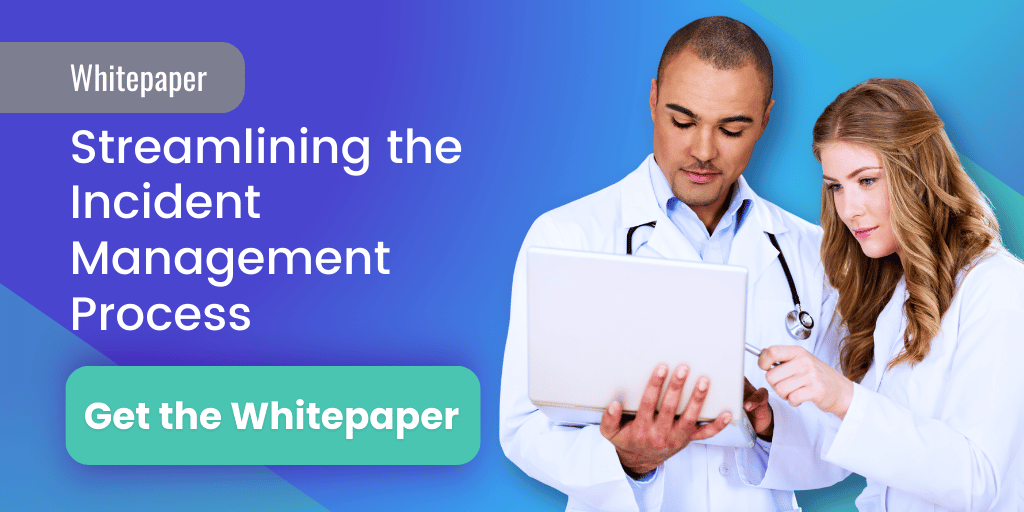3 min read
Benefits of Incident Management Software: Ensuring Patient Safety
Performance Health Partners
December 13, 2023

Incident management software is revolutionizing healthcare by significantly minimizing the impact of incidents on patient safety. This innovative tool not only streamlines the process of managing incidents and events but also accelerates the implementation of corrective actions. By optimizing the efficiency of these critical tasks, healthcare professionals can shift their focus back to what matters most: delivering the highest quality care in the safest possible environment.
Read on to explore the transformative impact of integrating incident management software in your organization and the pivotal role this technology plays in enhancing operational efficiency and patient safety.
The Evolution of Incident Management
Traditional incident management in healthcare has been characterized by structured yet cumbersome processes. Using conventional methods, care providers, once identifying an event or incident, often face the daunting task of filling out complex forms, leading to significant time investment. These forms, crucial for understanding and resolving incidents, accumulate, burdening managers with the task of sifting through them to discern patterns and root causes. The reliance on paper forms compound these challenges, as they are prone to getting lost or being difficult to interpret.
The limitations of manual incident management are multifaceted. They include:
- Fear of Legal Repercussions: Healthcare staff may be hesitant to report incidents due to fear of legal consequences, which impedes risk identification and mitigation.
- Impact on Patient Safety: This reluctance to report incidents directly affects patient safety, as potential risks remain unaddressed.
- Ineffective Communication: There is often poor follow-up and communication regarding reported incidents, leading to compromised patient safety and increased organizational liability.
- Flawed Reporting Systems: The structure and design of manual reporting systems may be inadequate, hindering accurate risk identification.
- Complexity of Risk Management in Healthcare: The vast array of clinical and administrative systems and processes in healthcare adds to the complexity, posing challenges to efficient incident management.
In contrast, incident management software offers a modern, more efficient solution to these challenges. This technology provides a centralized framework for managing a wide range of incidents – from privacy breaches to patient safety concerns – from initiation to resolution.
Its implementation allows for a more streamlined reporting process. Employees can report incidents through simple online forms, accessible even on mobile devices, significantly reducing the time and complexity of the reporting process. For instance, Vivere-Audubon Surgery Center observed a drastic reduction in incident report completion time, from 45 minutes to a mere three minutes, after adopting Performance Health Partners’ incident management software.
An incident management system not only simplifies the reporting process but also supports various analytical methods to pinpoint the causes of incidents and facilitates the initiation of appropriate responses. Furthermore, it offers in-depth risk management analysis tools, enabling healthcare organizations to manage challenges confidently and efficiently, thereby streamlining response efforts.
Key Benefits of Incident Management Software
Streamlined Incident Reporting
Healthcare incident management software streamlines the incident reporting process in the following ways:
- Facilitation of Reporting: Healthcare incident management software simplifies the incident reporting process with simplified forms that can be accessed from various devices, making it more efficient for staff, particularly physicians.
- Customization and Time Efficiency: Organizations can tailor their reporting systems to capture only essential information, significantly reducing the time spent on filling out reports.
- Increased Reporting Rates: By making the process more accessible and quicker, there's an anticipated rise in incident reporting rates. A South Australian hospital survey highlighted that while around 94% of physicians were aware of incident reporting systems, less than half knew how to complete and submit reports, mainly due to time constraints. Incident management software aims to address this gap by simplifying the process and providing easy-to-learn functionalities.
Workflow Automation
Incident management software automates tasks, alerts, and reminders, offering tools like to-do lists and progress notifications to enhance efficiency. This allows for:
- Insightful Reporting: It features configurable reports and dashboards to analyze incident patterns and causes.
- Time Savings and Focus on Patient Care: Salesforce reports that automation can save up to 50% of the time previously spent on manual tasks, allowing healthcare professionals to spend more time focusing on patient care.
- Risk Reduction and Improved Productivity: Automated processes in healthcare can lead to reduced work cycles, lower overhead, increased compliance, and competitive advantages.
- Role-Based Guidance and Feedback: The software provides automated feedback for reporters of incidents, events and near misses, and guides users based on their specific roles, enhancing patient safety.

Communication and Collaboration Tools
Healthcare incident management software integrates secure communication and collaboration tools to:
- Streamline Workflows: The integration of secure communication and collaboration tools in the software facilitates seamless interaction among various departments and stakeholders, quickening incident response.
- Reduce Medical Malpractice Risks: Effective communication is crucial, as studies show that about 27% of medical malpractice cases are linked to communication failures.
- Enable Real-Time Quality Management: Advanced analytics monitor quality management consistently, flagging anomalies and notifying relevant personnel for immediate action, thus improving the efficiency and timeliness of incident resolution and ultimately enhancing patient safety.
Analytics and Follow-Up
Robust analytics and follow-up features that enable in-depth risk analysis of healthcare incidents are some of the best benefits of incident management software. They include:
- Advanced Risk Analysis: The incident reporting software offers robust analytics for in-depth analysis of incidents and events, providing real-time insights and alerts for better management decision-making.
- Multiple Analysis Methods: The software supports various methods for analyzing incident causes, enhancing the thoroughness and accuracy of investigations.
- Streamlined Roto Cause Analysis (RCA): It streamlines the investigation process, notably reducing the time required for RCA, as evidenced by the Nebraska Department of Health and Human Services' report on traditional analysis duration.
Ready to Get Closer to Zero Harm?
Incident management software like Performance Health Partners’ can help streamline the incident management process, making it more convenient for the entire care team to play a role in improving patient and employee safety. Learn how incident management software can help your organization improve efficiency by scheduling a call with our team.


